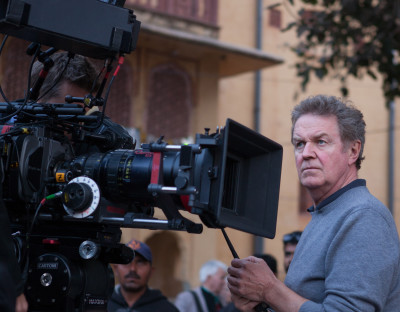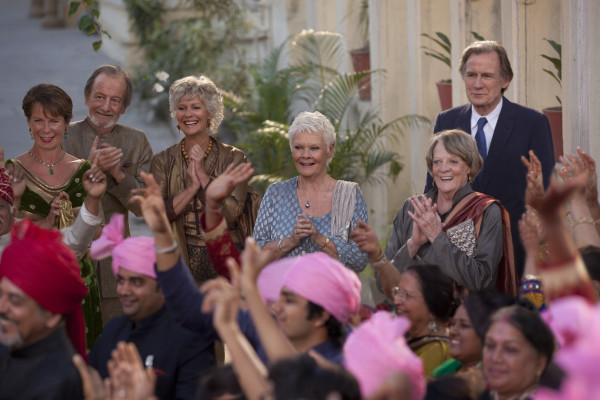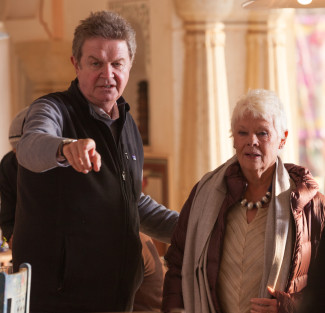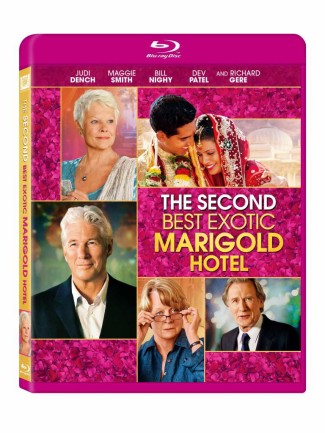INTERVIEW: Director John Madden revisits ‘Exotic Marigold Hotel’

John Madden, director of Shakespeare in Love and The Best Exotic Marigold Hotel, recently decided to take a second cinematic trip to India for the appropriately titled sequel, The Second Best Exotic Marigold Hotel. The comedy, starring Judi Dench, Maggie Smith, Dev Patel and Richard Gere, will be released on DVD and Blu-ray Tuesday, July 14 from 20th Century Fox Home Entertainment.
“Well, who wouldn’t want to go back?” Madden said recently during a phone interview. “The first film … was a challenge but also an incredibly enjoyable film to make for a 101 reasons, not just the cast and so forth, but mainly India and working with the Indian crew and the Indian actors made it very special. But none of us had any expectation that the film would find an audience the sort of breadth and size it did.”
That 2012 feature was an international success that pulled together some of the best British actors in the business. From Dench and Smith to Penelope Wilton, Tom Wilkinson and Bill Nighy, the cast was a who’s who of London’s West End and Masterpiece classics. The original story follows a group of adventurous retirees who travel to India to enjoy a hotel that promises luxury; however, it doesn’t quite live up to its “exotic” name. Along the way, they learn a little about India and a lot about one another. The second film in the series continues this exploration and discovery with the characters trying to make a go at living in India permanently.

“A very quiet discussion was begun sometime after that [the original’s release] to say, as it was put to me, ‘Would you ever consider continuing the story?’” Madden said. “And our reaction, that’s to say me, the writer and the producer, the sort of creative core, we all agreed that we wouldn’t want to repeat the film. We wouldn’t want to just do a strict sequel of the same film over again, but when we examined the circumstances we realized that the film left the story unfinished in a way. It actually depicted as it did eight people of a particular age making a giant decision about their lives, i.e. to go and live somewhere else in an incredibly different and foreign environment. Then the film ended with the majority of those people making an even bigger decision, which is to stay, and therefore there was a story that was waiting to be, I suppose, concluded is the way I started to figure it.”
The next step was for Madden and the screenwriter, Ol Parker, to talk with the cast about their willingness to visit the hotel again. “And they all said yes, and we said, well, let’s see if we can,” he said. “I consider the two films now to be sort of part of a diptych, if you see what I mean, a pair. So the first one begins the story, and the second one ends it. Because actually we trace each of their journeys very completely and coherently from the beginning of the first one to the end of the second. … And the only other thing I would say it’s not that often you get a chance to work again with a cast of that caliber, and to write for them again, and understanding the nuances of those characters and particularly writing for an audience that also understands the nuances of those characters. That’s the unusual thing about it.”

Working and filming in India is a “very concentrated and intoxicating experience,” Madden said. The cast and creative team seemed to relish the opportunity to visit once again.
“Well, you know, it is a uniquely challenging place to work,” he said. “The story is set, as you know, in a very, very vibrant and chaotic city, which is Jaipur, which sort of epitomizes the kind of collision of an older India and a more modern India because Jaipur used to be an entirely kind of agriculturally based city. But now modern India, technological India and so forth is erupting all over the place. So the two things jostle for position.”
This jostling produces a beautiful background for the film. The director described the streets as crowded with cars, buses, rickshaws, animals and people. He decided early on that it was useless to control the environment. Instead, the team simply worked with the unique atmosphere.
“I simply developed strategies of putting the camera in such a place that people couldn’t really sense it was there and just launched the actors into it because that was the best way of capturing what was there,” he said. “Beyond that, from a technical standpoint, it’s not challenging because they have a very, very, very powerful and pervasive film industry of their own, as you know, one that dwarfs Hollywood to an extent. And so the crews are very experienced. Your crews [in India] are numerically larger than American ones tend to be, so that part of it is very efficient. But noise, heat, animals, all of these things just generally conspire to make filming very challenging.”
The movies have struck a chord with audiences because they attempt to answer some important questions about retirement, aging and the approach of mortality. Not everyone gets to move to India, but many audience members need to answer questions about the last stages of their life.

“Look we have to put the movies in a context, and the model we always had for them creatively was a Shakespearean comedy,” he said. “I only say that not to sound pretentious but to say, you know, they exist in a particular world. And part of that world is slightly heightened obviously, so you know in Shakespeare it’s the forest of Arden. And India stands in for the forest of Arden and so forth, but the point that I’m making is that Shakespearean comedies deal with quite serious subjects and, you know, the emotional travails of one kind or another. And in this particular case it’s the emotional travails … at the end of their lives or approaching the end of their lives where mortality and the issues that surround it are quite present in the minds of the people who we’re watching. And I think those translate out of that circumstance in many, many ways.”
If Madden had to sum up the message of the film: “Nothing ends until you want it to end.”
India revitalizes and reinvigorates the characters’ lives. This is not a consequence solely of culture but also community. “I think the films communicate by humor and by a sort of magic I suppose,” he said. “I think that that gets under people’s skin, and I can’t really articulate exactly what made the first one, and indeed the second one as it’s turned out, reach an audience to the extent that it has, but something in there is obviously resonating with an audience about what the experience of people at that stage in their lives is or could be.”
Madden said working with Gere was a special experience. The American actor, who has a deep connection to India, is the new addition to the cast.
“I’ve always admired him [Gere] as an actor, and in recent years he’s shown a publicly declared interest in doing a different kind of movie,” the director said. “He’s moved away from what you would call Hollywood mainstream I think and tends to be more attracted to slightly more independent-minded films. … As we started to write it, for some reason the idea of Richard came into our heads, and we started to write toward that. … He just fitted in with the others immediately. Some of them he knew and worked with, but not many, and it was absolutely terrific. We had a very, very good time. I think he’s terrific in it, too.”
Madden has directed many films in his successful career. From Shakespeare in Love to The Debt to Captain Correlli’s Mandolin, his filmography is quite impressive. It has been a while, though, since he spent so much time on comedy.
“Shakespeare in Love was the last comedy I made before these two, and I think all three of those films have something in common probably,” he said. “I hadn’t remembered until I started making these how enjoyable it is to make a comedy. It’s also very taxing and very difficult because, you know, you got a long way to fall with a comedy, probably longer and farther than you do with other films. Because a comedy that doesn’t take off is a sorry sight to behold, but this one was particularly special.”
The legacy of the two Exotic Marigold Hotel films may be India itself: “It forged a kind of unbreakable connection with India for me, well, for all of us really involved in it. It’s not a place you can easily forget or walk away from. It sort of changes you in some profound way.”
By John Soltes / Publisher / John@HollywoodSoapbox.com
- The Second Best Exotic Marigold Hotel arrives on DVD and Blu-ray Tuesday, July 14 from 20th Century Fox Home Entertainment.

